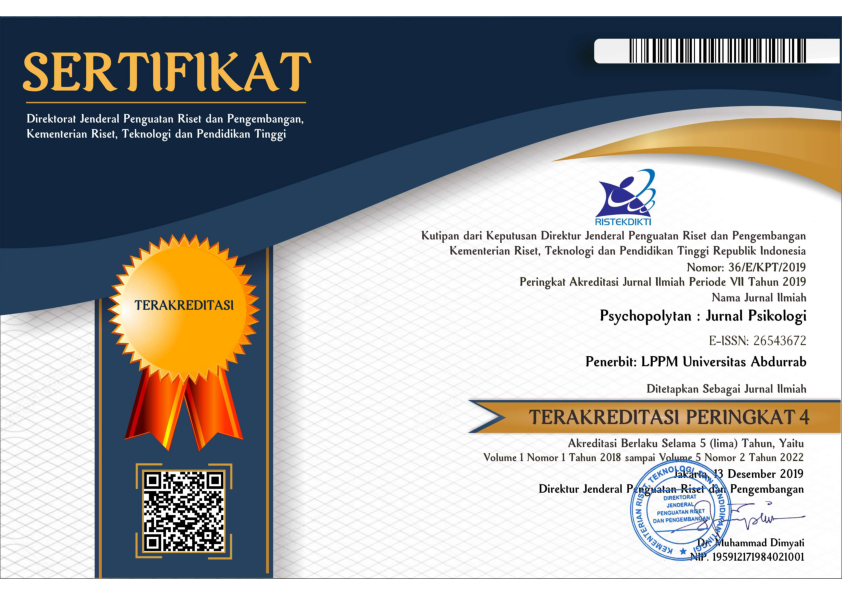Kesepian Sebagai Mediator Antara Dukungan Sosial dengan Kecenderungan Adiksi Video Game pada Anak
(Submitted 20 November 2020) (Published 28 Februari 2021)
Abstract
Bermain adalah kebutuhan bagi anak, meskipun saat ini memainkan video game lebih banyak diminati dibanding permainan tradisional. Kemudahan untuk mengakses permainan video game yang berlebihan dapat mengakibatkan munculnya masalah. Penelitian ini bertujuan untuk mengetahui hubungan antara rendahnya dukungan sosial offline dan kecenderungan adiksi video game dimediasi oleh kesepian pada anak usia akhir. Penelitian ini dilakukan dengan metode survei yang melibatkan 308 anak dengan rentang usia 9-12 tahun. Analisis menggunakan regresi berganda dan SEM berdasarkan komponen. Hasil penelitian ini menunjukkan bahwa semakin rendah dukungan sosial offline berpengaruh terhadap meningkatnya kesepian secara langsung. Anak dengan dukungan sosial offline yang rendah berdampak pada meningkatnya kecenderungan adiksi video game secara langsung, namun begitu anak yang merasa kesepian tidak berpengaruh pada kecenderungan adiksi video game yang tinggi. Hipotesis pada penelitian ini ditolak, yaitu kesepian tidak berperan sebagai mediator dalam hubungan antara rendahnya dukungan sosial offline dan kecenderungan adiksi video game dengan koefisien tak langsung sebesar -0.066 (sig > 0.05), namun kesepian dan rendahnya dukungan sosial offline berperan sebagai variabel prediktor terhadap kecenderungan adiksi video game dengan sumbangan efektif sebesar 10.3%. Artinya bahwa semakin anak merasa kesepian dan mendapat dukungan sosial offline yang rendah, semakin tinggi kecenderungannya menjadi adiksi video game.
References
Bray, G. (2008). Effect of video and computer games on children. Trans. Pour Abedini Naeeni H. Tehran: Javaneh Roshd Publication
Cevik, G.B., Yildiz, M.A. (2017). The Roles of Perceived Social Support, Coping, and Loneliness in Predicting Internet Addiction in adolescents. Journal of Education and Practice Vol. 8, No. 12. ISSN 2222-1735 (Paper) ISSN 2222-288X (online)
Hagen, K.A., Myers, B.J., Mackintosh, V.H. (2005). Hope, Social Support, and Behavioral Problems in At-Risk Children. American Journal of Orthopsychiatry Vol 75, No. 2, 211-219. DOI: 10.1037/0002-9432.75.2.0
Harter, S. (2012). Social support scale for children: Manual and questionnaires revision of 1985 manual. Denver: Denver University.
Jogiyanto, H, & Abdillah, W. (2016). Partial Least Square (PLS) untuk Penelitian Empiris. Yogyakarta: BPFE Fakultas Ekonomi dan Bisnis UGM
Justin, M; Patry, BS; Chuck, A; Burgess, BS; Thomas, M; Laporte, BA; Mason, G; Haber. (2013). online and offline Social Support and Health Among Massively Multiplayer online Role Playing Game Players. The University of North Carolina at Charlotte
Kalkan, M; Epli-Koc, H. (2011). Perceived Social Support From Friends as Determinant of Loneliness in a Sample of Primary School. US-China Education Review, ISSN 1548-6613, Vol. 8, No. 4, 547-551. Turkey: David Publishing
King, D., & Delfabbro, P. (2009). Understanding and assisting excessive players of video games: A community psychology perspective. The Australian Community Psychologist, 21(1), 62-74
Knoetze, J. S. (2012). An Emotional Awareness Program for Children in Middle Childhood, for Utilization in Educational System. Thesis. Faculty Of Humanities: University of Pretoria
Kusumadewi T. N. (2009). Hubungan antara kecanduan internet game online dan keterampilan sosial pada remaja. Skripsi. Jakarta: Universitas Indonesia
Lemmens, J. S., Valkenburg, P. M., & Peter, J. (2009). Development and Validation of a Game Addiction Scale for Adolescents. Media Psychology, 12 (1), 77–95. https://doi.org/10.1080/15213260802669458
Lemmens, J. S., Valkenburg, P. M., & Gentile, D. A. (2015). The Internet Gaming Disorder Scale. Psychological Assessment, 27 (2), 567–582. https://doi.org/10.1037/pas0000062
Leung, L. (2011). Loneliness, social support, and preference for online social interaction: the mediating effects of identity experimentation online among children and adolescents. Chinese Journal of Communication, Vol 4, No. 4, 381-399
Lin, M.P., Wu, J.Y., You, J., Chang, K., Hu, W., Xu, S. (2018). Association between online and offline social support and internet addiction in a representative sample of senior high school students in Taiwan: The mediating role of self-esteem. Computers in Human Behavior, doi: 10.1016/j.chb.2018.02.007
Liu, J; Li, D; Purwono, U; Chen, X; French, DC. 2015. Loneliness of Indonesian and Chinese Adolescents as Predicted by Relationships With Friends and Parents. Merrill-Palmer Quarterly Vol. 61, No. 3
Longman, H., O’Connor, E. L., & Obst, P. L. (2009). The effect of social support derived from World of Warcraft on negative psychological symptoms. Cyber Psychology and Behavior, 12(5), 563-566.
Pontes, H.M., Griffiths, M.D., Patrao, I.M. (2014). Internet Addiction and Loneliness Among Children and Adolescents in the Education Setting: An EMpirical Pilot Study. Aloma, 32 (1), 91-98. ISSN: 1138-3194
Poole, E.S., Eiriksdottir, E., Miller, A.D., Xu, Y., Catrambone, R., Mynatt, E.D. (2013). Designing for Spectators and Coaches: Social Support in Pervasive Health Games for Youth. 7th International Conference on Pervasive Computing Technologies for Healthcare and Workshops. DOI 10.4108/icst.pervasivehealth.2013.252157
Prabowo, O., Juneman. (2012). Penerimaan Teman Sebaya, Kesepian, dan Kecanduan Bermain Gim Daring Pada Remaja di Jakarta. Mimbar Jurnal Sosial dan Pembangunan, Vol. 28, No.1
Rotenberg, K.J., Macdonald, K.J., King, E.V. (2004). The Relationship Between Loneliness and Interpersonal Trust During Middle Childhood. Genetic Psychology 165, 233-249
Santrock, J.W. (2013). Life Span Development 14th ed. New York: McGraw-Hill Companies, Inc.
Seay, A., Fleming, & Kraut, R. E. (2007). Project Massive: Self-regulation and problematic use of online gaming. Proceedings from CHI 2007: San Jose, CA, USA
Tabak, I., Zawadzka, D. (2017). Loneliness and Internet Addiction of Polish Adolescents. Psychiatry Psycology Klin, 17 (2), 104-110. DOI: 10. 15557/PiPK.2017.0011
Tavormina, M.G.M., Tavormina, R. (2017). Playing with Video Games: Going to a New Addiction?. Psychiatria Danubina (Suppl 3), 422-426
The Asian Parent Insight. (2014). Mobile Device Usage Among Young Kids: A Southeast Asia Study. Samsung KidstimeTM.
Wan CS, Chiou WB. (2006). Why are adolescents addicted to online gaming? An interview study in Taiwan. Cyberpsychology Behavior 9(6): 762-6.
Wimbarti, S dalam Nurazhar (2018). Gence: Membedah Anatomi Peradaban Digital. Bandung: Tasdiqiya Publisher
Yeh, Y., Ko, H., Wu, J., Cheng, C. (2008). Gender Differences in Relationships of Actual and Virtual Social Support to Internet Addiction Mediated Through Depressive Symptoms among College Students in Taiwan. Cyberpsychology and Behavior, Vol. 11, No. 4. Mary Ann Liebert, Inc. DOI: 10.1089/cpb.2007.0134
Copyright (c) 2021 Psychopolytan : Jurnal Psikologi

This work is licensed under a Creative Commons Attribution-NonCommercial-ShareAlike 4.0 International License.
1. Copyright of all journal manuscripts is held by the Psychopolytan : Jurnal Psikologi
2. Formal legal provisions to access digital articles of electronic journal are subject to the provision of the Creative Commons Attribution-ShareAlike license (CC BY-NC-SA), which means that Psychopolytan : Jurnal Psikologi is rightful to keep, transfer media/format, manage in the form of databases, maintain, and publish articles.
3. Published manuscripts both printed and electronic are open access for educational, research, and library purposes. Additionally, the editorial board is not responsible for any violations of copyright law.
licensed under a Creative Commons Attribution-ShareAlike 4.0 International License.
 pdf
pdf
 Abstract views: 707
Abstract views: 707
 downloads: 712
downloads: 712

 :
:








